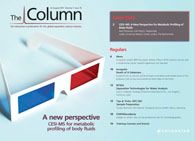Distinguished research award
Dr Judit Villen of the University of Washington, Seattle, USA, has been presented with the American Society for Mass Spectrometry (ASMS) 2011 Research Award.
Dr Judit Villen of the University of Washington, Seattle, USA, has been presented with the American Society for Mass Spectrometry (ASMS) 2011 Research Award. Sponsored by Thermo Fisher Scientific, the annual award recognizes and supports breakthrough academic research by young scientists in the field of mass spectrometry (MS).
An independent and anonymous ASMS committee chose Dr Villen based on her research on the MS-based analysis of protein phosphorylation in single cells. Her goal is to understand the complex cellular signalling networks that impact the expression of cancers, such as human breast cancer. The early-stage research that will be supported by the award, focuses on the development of a novel interface for single-cell MS using the company’s Orbitrap LC–MS system.
“Until now, MS studies measured proteins based on the average of millions of cells, completely missing the variations between individual cells that can have substantial consequences in signalling cell growth, proliferation and differentiation, all of which play roles in the expression of diseases such as cancer,” said Ian Jardine, vice president of global R&D at the company. “Through her early-stage effort to develop an interface for single-cell mass spectrometry analysis, Dr Villen will launch an exciting new era of single-cell proteomics.”
For more information about the company’s mass spectrometry solutions visit www.thermoscientific.com/ms
This story originally appeared in The Column. Click here to view that issue.
New TRC Facility Accelerates Innovation and Delivery
April 25th 2025We’ve expanded our capabilities with a state-of-the-art, 200,000 sq ft TRC facility in Toronto, completed in 2024 and staffed by over 100 PhD- and MSc-level scientists. This investment enables the development of more innovative compounds, a broader catalogue and custom offering, and streamlined operations for faster delivery. • Our extensive range of over 100,000 high-quality research chemicals—including APIs, metabolites, and impurities in both native and stable isotope-labelled forms—provides essential tools for uncovering molecular disease mechanisms and exploring new opportunities for therapeutic intervention.
New Guide: Characterising Impurity Standards – What Defines “Good Enough?”
April 25th 2025Impurity reference standards (IRSs) are essential for accurately identifying and quantifying impurities in pharmaceutical development and manufacturing. Yet, with limited regulatory guidance on how much characterisation is truly required for different applications, selecting the right standard can be challenging. To help, LGC has developed a new interactive multimedia guide, packed with expert insights to support your decision-making and give you greater confidence when choosing the right IRS for your specific needs.

.png&w=3840&q=75)

.png&w=3840&q=75)



.png&w=3840&q=75)



.png&w=3840&q=75)











